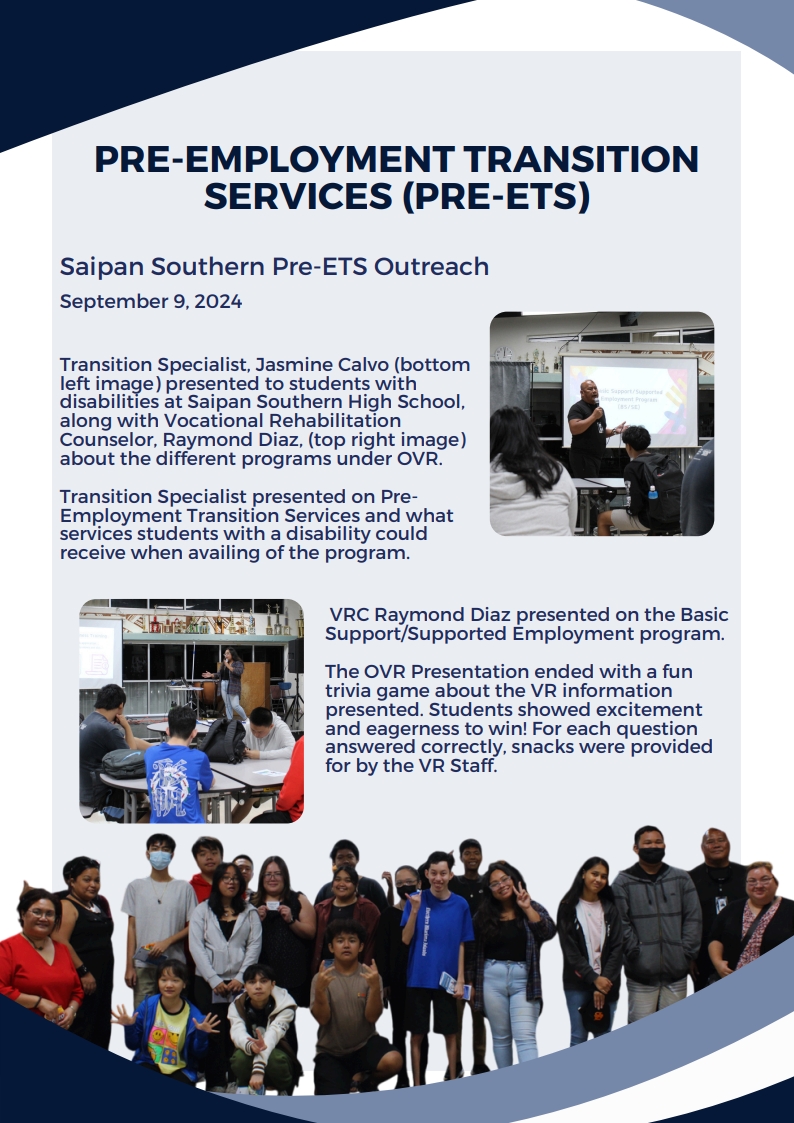THE authorizing federal law for the Office of Vocational Rehabilitation requires that we set aside at least 15% of our basic support/supported employment federal funds to provide "pre-employment transition services" to "students with Disabilities who are eligible or potentially eligible for VR services." As such, we are looking for creative ideas and/or proven ways to deliver pre-employment services accordingly. We welcome proposals from qualified vendors/contractors to provide Pre-Employment Transition Services for high school students with disabilities. Required activities must include one or all of the following:
1) Job exploration counseling
Job exploration counseling may be provided in a classroom or community setting and include information regarding in-demand industry sectors and occupations, as well as non-traditional employment, labor market composition, administration of vocational interest inventories, and identification of career pathways of interest to the students. Job exploration counseling provided on an individual basis might be provided in school or the community and include discussion of the student's vocational interest inventory results, in-demand occupations, career pathways, and local labor market information that applies to those particular interests.
2) Work-based learning experiences
Work-based learning experiences in a group setting may include coordinating a school-based program of job training and informational interviews to research employers, work-site tours to learn about necessary job skills, job shadowing, or mentoring opportunities in the community. Work-based learning experiences on an individual basis could include work experiences to explore the student's area of interest through paid and unpaid internships, apprenticeships (not including pre-apprenticeships and Registered Apprenticeships), short-term employment, fellowships, or on-the-job training located in the community. These services are those that would be most beneficial to an individual in the early stages of employment exploration during the transition process from school to post-school activities, including employment. Should a student need more individualized services (e.g., job coaching, orientation, mobility training, travel expenses, uniforms or assistive technology), he or she would need to apply and be determined eligible for vocational rehabilitation services and develop and have an approved individualized plan for employment. These additional services must be charged TO VR expenditure separate from the funds reserved for providing pre-employment transition services.
3) Counseling on postsecondary education options
Counseling on opportunities for enrollment in comprehensive transition or postsecondary educational programs at institutions of higher education in a group setting may include information on course offerings, career options, the types of academic and occupational training needed to succeed in the workplace, and postsecondary opportunities associated with career fields or pathways. This information may also be provided on an individual basis and may include advising students and parents or representatives on academic curricula, college application, and admissions processes, completing the Free Application for Federal Student Aid, and resources that may be used to support individual student success in education and training, which could include disability support services.
4) Workplace readiness training
Workplace readiness training may include programming to develop social skills and independent living, such as communication and interpersonal skills, financial literacy, orientation and mobility skills, job-seeking skills, understanding employer expectations for punctuality and performance, as well as other “soft” skills necessary for employment. These services may include instruction, as well as opportunities to acquire and apply knowledge. These services may be provided in a generalized manner in a classroom setting or be tailored to an individual's needs in a training program provided in an educational or community setting.
5) Instruction in self-advocacy
Instruction in self-advocacy in a group setting may include generalized classroom lessons in which students learn about their rights, and responsibilities, and how to request accommodations or services and supports needed during the transition from secondary to postsecondary education and employment. During these lessons, students may share their thoughts, concerns, and needs, in order to prepare them for peer mentoring opportunities with individuals working in their area(s) of interest. Further individual opportunities may be arranged for students to conduct informational interviews or mentor educational staff such as principals, nurses, teachers, or office staff; or they may mentor individuals employed by or volunteering for employers, boards, associations, or organizations in integrated community settings. Students may also participate in youth leadership activities offered in educational or community settings.
For more detailed information about Pre-ETS, interested vendors are welcome to schedule a meeting with and/or email Jim Rayphand at This email address is being protected from spambots. You need JavaScript enabled to view it. or Sam Santos at This email address is being protected from spambots. You need JavaScript enabled to view it. for more or may pick up a description of services at the Office of Vocational Rehabilitation located on Delgado Drive, Navy Hill or call the office at (670) 322-6537/38.

